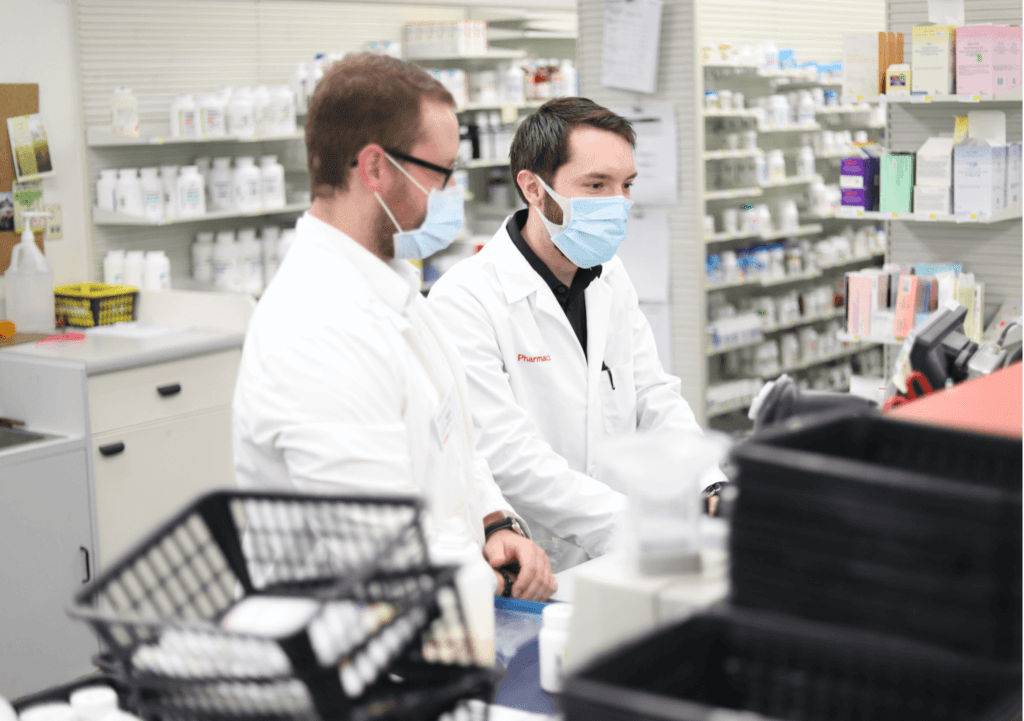About Us
The South College School of Pharmacy program team is here to assist you throughout the admissions and application process, starting with helping you to understand our program requirements and how to apply.

School of Pharmacy • Admissions • Curriculum • Tuition & Scholarships • Resources • About Us

Message from the Dean
Thank you for your interest in South College School of Pharmacy. We are honored to invite you to visit our program either in-person, virtually in a Zoom meeting with our admissions coordinator, or via attendance at one of our on-campus information sessions.
Our mission is to “prepare pharmacy students to be proficient practitioners who deliver team-oriented, patient care with advocacy and compassion to diverse populations.” As a student pharmacist at South College School of Pharmacy, you will be able to complete your Doctor of Pharmacy (PharmD) in 3 years. We offer the only 3-year Doctor of Pharmacy program in the state of Tennessee. Completing your PharmD in 3 years affords you the advantage of entering the workforce one year earlier, or completing your degree and a postgraduate year one (PGY1) residency in 4 years as opposed to 5 years through a traditional program.
South College School of Pharmacy is equipped with modern classrooms and research laboratories designed to deliver and foster a dynamic and active learning environment. Our faculty are recognized in their field of study, whether it be in pharmacy practice or pharmaceutical sciences. Supporting our faculty and your success is a dedicated, caring and nurturing professional staff. Additionally, our students are offered leadership and volunteer opportunities through our many student organizations.
Once again, THANK YOU, for your interest in South College School of Pharmacy. I encourage you to follow your dreams in pursuing a career in pharmacy, as this is an incredible profession filled with unlimited opportunities.
Kindest Regards,
Timothy M. Smith, PharmD, FABC, FASHP
Dean
Mission Statement
The mission of South College School of Pharmacy is to prepare pharmacy students to be proficient practitioners who deliver team-oriented, patient care with advocacy and compassion to diverse populations. The School of Pharmacy achieves its mission through commitment to excellence in education, scholarly activity including research, service, and patient care.

Learn More
Strategic Priorities & Goals
Strategic Priority 1: Educational Outcomes (Assuring Student Success)
Goal 1: Maintain and deliver an effective, contemporary pharmacy curriculum that assures exceptional academic and professional success for our students.
Goal 2: Graduates are gainfully employed in profession or in post-graduate training.
Strategic Priority 2: Strategic Enrollment Management
Goal 3: Recruit, enroll, and retain qualified student pharmacists with diverse backgrounds.
Goal 4: Recruit, enroll, and retain qualified student pharmacists with diverse backgrounds in the online/distance program
Goal 5: Promote and successfully deliver supplemental programs aimed to promote the SOP and enhance marketability of graduates in non-traditional pharmacist roles
Strategic Priority 3: Pharmacy Profession, Scholarly Activity, and SCSOP Advocacy
Goal 6: Continue to advance pharmacy practice through education, research, innovative and collaborative practice models, and public health initiatives.
Goal 7: Maintain scholarly activity and original research that contributes to the advancement of scientific knowledge, pharmacy profession, and healthcare.
Strategic Priority 4: Infrastructure and Governance
Goal 8: Maintain effective operations in the School of Pharmacy.
Goal 8a: Justify and secure institutional financial support to advance the School of Pharmacy mission, vision, and goals; and to achieve and maintain full accreditation of the School of Pharmacy.
Goal 8b: Employ an effective communication system within the School of Pharmacy, and between the School of Pharmacy and stakeholders.
Student Learning Outcomes
The South College School of Pharmacy faculty have developed curricular abilities that are individualized, focused, and consistent with the Center for the Advancement of Pharmaceutical Education (CAPE) educational outcomes, the American Association of Colleges of Pharmacy (AACP) supplements, the North American Pharmacist Licensure Examination (NAPLEX) competency statements, and the Medication Therapy Management (MTM) (all total of 362 competencies). All of these abilities and outcomes were given codes for easy reference and future database linking.
I. Demonstrate Fundamental Knowledge and Skills
II. Apply Critical Thinking, Problem Solving, and Decision Making Abilities
III. Exhibit Professional Behavior and Ethical Conduct
IV. Engage in Continuing Professional Development
V. Communicate and Collaborate Effectively
VI. Provide Patient-Centered Care
VII. Manage Healthcare Systems
VIII. Promote Public Health and Wellness
Professional/State Licensure
Pharmacists must be licensed by the state in which they intend to practice. Licensure laws and regulations for Pharmacists vary from state to state. Statutory and regulatory requirements for initial licensure and license renewal can be found at each state’s Board of Pharmacy website. A reference for each state Board of Pharmacy is available at the National Association of Boards of Pharmacy (NABP) website located here – https://www.aapa.org/download/19739/. In general, the North American Pharmacist Licensure Examination (NAPLEX) and the Multistate Pharmacy Jurisprudence Examination (MPJE) are required prior to licensure. Exceptions to this can be found here – https://nabp.pharmacy/programs/mpje/ . Graduation from an ACPE-accredited program is a requirement for licensure in all 50 states and U.S. jurisdictions. The South College School of Pharmacy program is accredited by ACPE. We work diligently with all students in preparation for licensure examinations.
Students participating in clinical learning experiences outside of Tennessee must comply with each state’s rules for intern licensure. The South College School of Pharmacy Office of Clinical Education requires that students attain intern licensure prior to any out of state learning experiences. Information on intern licensure requirements can be found at each state’s Board of Pharmacy website.
*Link Disclaimer: The South College School of Pharmacy (SCSOP) website provides links to websites operated by other parties, both private and public. The links are provided for the visitor’s convenience only. You are subject to the linked website’s privacy policy when you leave the SCSOP website. The presence of a link does not imply any endorsement of the material on the websites or any association with the website’s operators. SCSOP does not operate, control or endorse any information, products or services provided by third parties through the Internet. We are not responsible for the content and performance of these websites. Use of linked websites is strictly at the visitor’s risk, including any risks associated with destructive viruses.
Assessment Program
The mission of the South College School of Pharmacy Assessment Program is to facilitate the accomplishment of the mission and vision of South College and the mission, vision, goals, and abilities of the South College School of Pharmacy through systematic and sequential evaluation and continuous improvement of the composition, procedures and programmatic outcomes of teaching, service, research and scholarly activities.
The Assessment & Planning Committee goals include:
- Design and execute an effective assessment plan.
- Facilitate academic and nonacademic units in the SCSOP in identifying goals, outcomes, and appropriate assessment methods.
- Assist units of the SCSOP in their systematic and sequential collecting, analyzing, managing, and interpreting assessment data.
- Prepare and disseminate reports with recommendations for improvement to internal and external stakeholders.
